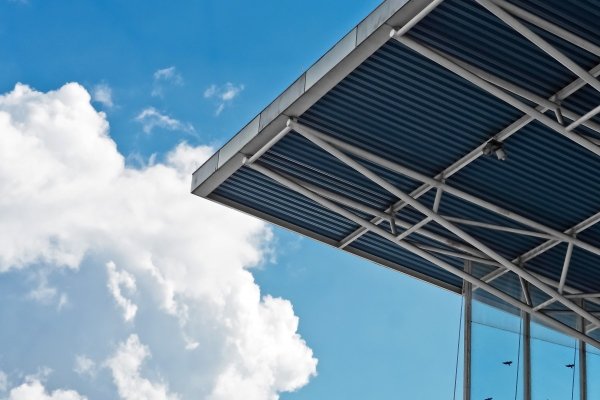
Metal roofing will never grow old. While the material can last for more than 50-70 years especially with careful and regular maintenance, having it as a roofing option is something every Denver CO homeowner should consider. True enough, metal roofing materials have their respective advantages and disadvantages, but no roofing material is ever completely infallible.
The earliest metal roofing material ever manufactured, homes in the 18th and 19th century used corrugated steel roofing. Their primary difference from their modern day counterpart: they were bare steel. Unfortunately, this rusted quickly during their early years. As manufacturing practices have improved in the next centuries, two different types of steel roofing exist such as:
Zinc is a corrosion-resistant metal that can withstand oxidation and prevents water and moisture from corroding the steel core it encloses. However, it is still fallible because a huge scratch or natural wear and tear can expose the steel core and accelerate rust.
Metal Supermarkets has a great explanation about how galvanizing works and the different methods of galvanizing steel below.
How Does It Work?
Galvanizing can protect metal is a number of ways. Firstly, it creates a protective coating that shields the metal from the surrounding environment. The layer of zinc prevents water and moisture and other elements in the air from corroding the steel underneath. Should the zinc coating be scratched deep enough, the metal would become exposed and susceptible to corrosion.
Galvanizing can also protect metal through a process called “galvanic corrosion”. Galvanic corrosion occurs when two metals of a different electrochemical make up are placed into contact with one another with an electrolyte present, such as salty water. Depending on the atomic structure of the two metals, one metal is the anode and the other is the cathode. The anode corrodes more rapidly than it would by itself and the cathode corrodes at a slower pace than it would by itself. The reason zinc is used for galvanizing is because it has an affinity towards being the anode when in contact with many different types of metals. Since the zinc coating in contact with the base metal is usually the anode, it slows the corrosion of the base metal, or the cathode.
Different Methods of Galvanizing
There are several different processes for galvanizing metal:
Hot-Dip Galvanizing
As the name implies, this method involves dipping the base metal into a molten pool of zinc. First, the base metal must be cleaned either mechanically, chemically, or both to assure a quality bond can be made between the base metal and the zinc coating. Once cleaned, the base metal is then fluxed to rid it of any residual oxides that might remain after the cleaning process. The base metal is then dipped into a liquid bath of heated zinc and a metallurgical bond is formed. (Continued)
Most Denver CO homeowners might view galvalumed roofs a more expensive variant of galvanized roofing. However, its high price is indicative of its protective and long-term capability. Galvalumed roofs use an aluminum-zinc-and-silicon roof coating that safeguards the steel roofing material core. In turn, it preserves the lifespan of galvalumed roofs efficiently.
Whirlwind Steel has an excellent explanation about galvalumation and everything else about it below.
Galvalume is created using a 55% to 45% ratio of aluminum to zinc alloy with a small amount of silicon to ensure durable and even adhesion. The aluminum is what differentiates Galvalume from galvanized steel.
Galvanization only includes the zinc alloy. Steel coated with Galvalume appears similar to galvanized steel but with a smoother appearance. Any visible crystals are smaller and closer together than the process of galvanization.
Galvalume is applied to both sides of cold-rolled steel sheets using a hot-dip process that protects edges as well. Using both zinc and aluminum in the coating takes advantage of the properties of aluminum to add primary protection above and beyond zinc.
Aluminum acts as barrier protection, whereas zinc provides self-healing properties against scratches. The zinc also acts as a sacrificial layer prolonging the life of the steel underneath. (Continued)
An undeniably expensive roofing material, aluminum is oustanding in its many capabilities. It can withstand corrosion without having additional coating. Additionally, it improves residential insulation and energy consumption. It's even an excellent choice for homes along beachsides or anywhere with high salt air.
If you're looking to improve your property's value, use an aluminum roof. You'll enjoy the following advantages too. Any dependable and experienced Denver CO roofing contractor recommends aluminum if it fits the budget because of its dependability as evidenced by Canadian Metal Roofing's list of aluminum advantages below.
BEAUTIFUL
Clean lines and many colour choices to enhance the look of any style home.
LIFETIME WORRY-FREE
So durable it comes with a lifetime non pro-rated warranty.
EXTREME WEATHER RESISTANT
Tested and guaranteed up to 120 mph hurricane force winds.
ENVIRONMENTALLY SMART
The most sustainable pitched roofing product available.
COOL ROOFING PRODUCT
High SRI cool roofing saves money and the environment.
MAINTENANCE FREE
Permanent and worry-free for life our roofs require no routine maintenance.
COASTAL CLIMATE GUARANTEE
The only roof guaranteed at any proximity to the ocean.
CLASS A FIRE RATED
The highest fire rating available for roofing products. (Continued)
The lifespan and performance of any roof greatly depends on the installation and maintenance of professional roofers. If you have yet to find a dependable local roofer, you can count on Roper Roofing to help you with all your roofing needs in Denver CO. Learn more about what we can do for you today!